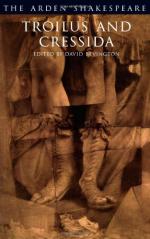|
This section contains 3,946 words (approx. 14 pages at 300 words per page) |

|
SOURCE: “Moral Order in Shakespeare's Troilus and Cressida: The Case of the Trojans,” in Anglia, Vol. 104, Nos. 1-2, 1986, pp. 33-44.
In the following essay, Eldridge examines the characters of Hector, Cressida, and Troilus, asserting that their common heritage as Trojans has more to do with their behavior than do the play's themes of love and war.
An established critical doctrine claims there is no discernible moral order within Shakespeare's Troilus and Cressida1. To say that is to say that the characters do wrong without punishment or suffer without cause. I would like to suggest a way of looking at the play that will show it less morally chaotic than so many readers have found it. The first step in this process—observing Cressida is a Trojan—is small but crucial. Critics have traditionally divided Troilus and Cressida into the Greeks and the Trojans or the love story and...
|
This section contains 3,946 words (approx. 14 pages at 300 words per page) |

|


